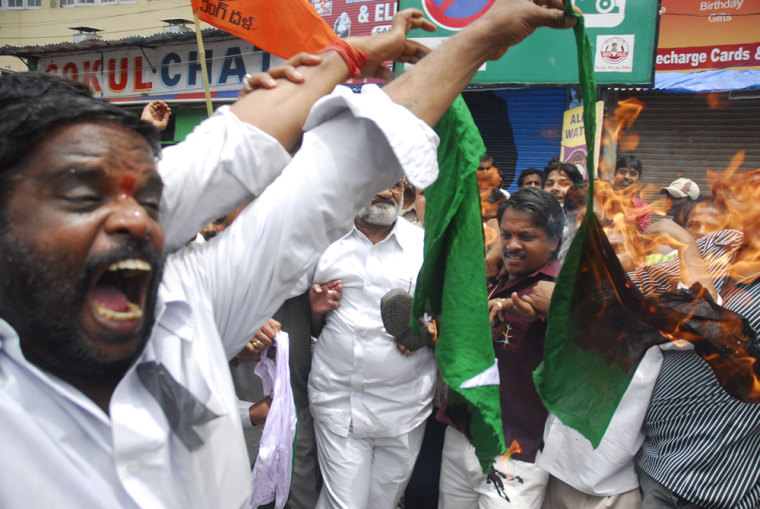The scenario has become frighteningly routine in this sprawling nation: Bombs are planted in crowded public spots — trains, parks, restaurants, markets — and synchronized blasts leave dozens of people dead and many more maimed.
Within hours, Islamic militants are blamed and Indian security forces are deployed across the country in search of the bombers. After months of investigation, though, the searches end with little more than accusations and long lists of suspects.
The examples have come all too frequently in recent years: In February, a bomb on a train traveling through north India on its way to Pakistan killed 68 people. In 2006, seven bombs went off on Mumbai commuter trains, killing more than 200 and wounding more than 700 others. In 2005, three bombs exploded in New Delhi markets, killing 62 people.
None of the investigations have led to the arrests of more than a handful of suspected militants, and most probes have stalled quickly.
On Saturday night, the cycle appeared to begin anew in the southern city of Hyderabad, when two bombs — one planted in a park during a laser show and the other at a family restaurant — exploded in quick succession. The explosions killed at least 42 people.
By the next morning, the government had announced who was responsible, or at least pointed a vaguely accusing finger at Islamic guerrilla groups based in neighboring Muslim countries.
“Available information points to the involvement of terrorist organizations based in Bangladesh and Pakistan,” said Y.S. Rajasekhara Reddy, chief minister of Andhra Pradesh state, where Hyderabad is located. He gave no details, saying only that, “It is not possible to divulge all this information.”
Few leads frustrate police
Analysts have little expectation this probe will turn out differently.
“These investigations don’t go anywhere,” said V.K. Sood, a retired lieutenant general and New Delhi-based defense analyst. “The authorities find it exceedingly difficult to specify who was actually behind the blasts ... It’s basically a guessing game.”
The attacks, most analysts believe, are rooted in Islamic militant groups, most of which are fighting to end Indian control of the Muslim-majority Himalayan territory of Kashmir.
But over the years, many of the myriad groups have splintered, and attacks are now often carried out by members of two or more major terror groups, often with the help of local hard-liners. Each person involved in the attack — suppliers, bomb-manufacturers, those who place the explosives — may not know the names of anyone else in the group, analysts say.
“You have completely decentralized processes,” said Ajai Sahni, head of the New Delhi-based Institute for Conflict Management. “There are no more ringleaders.”
Security increased, but many targetsIndia offers just too many targets, too many crowds.
“Our country is so big that even if we have the information that something is planned, we do not know where or when,” Home Minister Shivraj Patil said after the Hyderabad attacks.
As India has stepped up security in recent years at high-profile targets — such as the parliament building, which was attacked in 2001 — the militants have turned to softer, easier-to-hit places.
So military and political targets are avoided. Instead, the targets are ill-guarded and jammed with people from across India’s vast demographic spectrum: Hindus, Muslims, children, the elderly, men and women.
The toll has grown ominous. For the past two years, India was second only to Iraq in the number of terrorist fatalities worldwide, with 1,361 deaths in 2005 and 1,256 in 2006, according to statistics compiled by the U.S. government’s National Counterterrorism Center.
The goal of such attacks, government officials and many analysts say, is to sow anger between India’s Hindu majority and Muslim minority and destabilize the central government.
“They can create panic, and create anti-government feelings — that the government is doing nothing to protect innocent civilians,” said Sood, the retired general.
Indians blame government, police
Often, the bombings become political fodder.
The Hindu nationalist opposition, the Bharatiya Janata Party, called a protest strike Monday in Hyderabad that all but shut down the city, accusing the government of failing to stop the weekend bombings.
Such accusations have resonance among India’s lower classes, who have little faith in the government’s ability to take care of them.
“It is a frightening situation for common people,” said S. Vijaylakshmi, a government worker in Hyderabad. “It is a failure on the part of the government and the police.”
